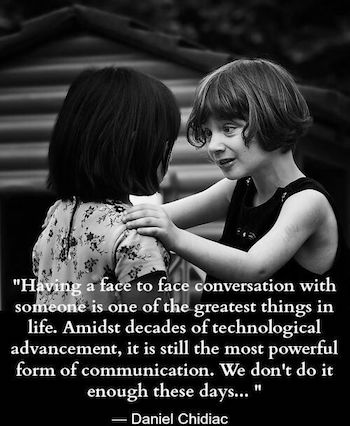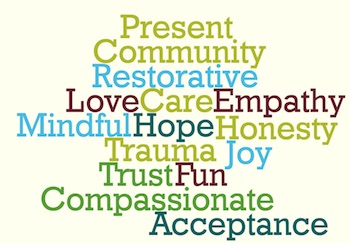Blog
Interact With Your Kids Using A Restorative Lens
Author: Kathleen Nelson-Simley
Posted: Friday - May 1, 2020
There are so many unknowns living through the current pandemic. I’ve never had more unanswered questions in my life than I do right now. Just when I get an answer to one question another unanswered question comes to mind. Perhaps you’ve had a lot of unanswered questions, too.
Lately, I’ve been wondering about the effects physical isolation will have on kids’ relationships with their peers. I also ponder what the impact will be for kids who have been physically disconnected from the daily routine of school and afterschool activities where they learn how to get along with others, gain a sense of belonging and community and build supportive relationships. While texting, phone calls, social media apps, FaceTime and Zoom can help to fill kids’ need to socially connect with others, does technology meet all of the emotional and mental needs a face-to-face, in-person connection can provide? Even so, when we open our doors and welcome kids back, what physical restrictions will we need to adhere to and how might they continue to influence a sense of community among kids and their overall well-being?
 We can let the unknown lead us around in circles, only to come back to the same unanswered question, or we can seek possible answers by tuning into our own common sense, instincts and life experiences.
We can let the unknown lead us around in circles, only to come back to the same unanswered question, or we can seek possible answers by tuning into our own common sense, instincts and life experiences.
One thing I do know for sure is that as humans we are hard-wired to connect with each other. Just as we need food, shelter and clothing, we also need strong meaningful relationships to thrive.
Kids will experience some negative effects of being physically isolated during this pandemic. The longer it continues, the greater the effects will likely be. Some kids will come out of physical isolation experiencing little to any negative effects. Other kids will not. The problem is we can’t predict which kids will fare better than others. We really won’t know who they are until we are back together in-person again. One thing I believe we can accurately predict is the kids who are negatively impacted will self-identify themselves through an array of “acting out” behaviors.
Anticipating this and preparing for it now can help you better respond to your kids as soon as you are reunited with them. Being ready to offer a supportive, caring, empowering and safe environment for all of your kids will be vitally important. One proven practice I highly recommend you consider using to create this kind of environment is restorative approaches.
Restorative approaches are about building community and strengthening relationships. They are based on the premise that when we feel part of a supportive community we respect others in that community and become accountable to it. When put into practice effectively the effects of restorative approaches can be profound. Studies show kids experience greater safety, a sense of belonging and build stronger relationships from restorative approaches which results in more cooperation, responsibility, respect and learning.
Restorative practices are based on the following principles:
-
Acknowledge that relationships are central to building a community.
-
Build systems that address misbehavior and harm in a way that strengthens relationships.
-
Focus on the harm done rather than only on rule-breaking.
-
Give voice to the person harmed.
-
Engage in collaborative problem solving.
-
Empower change and growth.
-
Enhance responsibility.
In a nutshell, using a restorative approach means you care more about creating a community built upon kindness, mutual respect and compassion than on consequences.
 Restorative approaches may be a new concept to you or perhaps it’s something you have already been using in your work with kids. No matter if you have no experience or lots of experience with restorative practices, I want you to meet Bill Michener. He is the only independent trainer of trainers of restorative practices through Restorative Solutions, Inc. Bill was also a trainer for four years through the International Institute for Restorative Practices training staff in juvenile justice funded programs, school systems and community-based youth programs. He also started a successful, first ever, Alternative Suspension Program centered around restorative practices. His extensive training experience, coupled with his passion for and hands-on experience using restorative practices with kids, is invaluable.
Restorative approaches may be a new concept to you or perhaps it’s something you have already been using in your work with kids. No matter if you have no experience or lots of experience with restorative practices, I want you to meet Bill Michener. He is the only independent trainer of trainers of restorative practices through Restorative Solutions, Inc. Bill was also a trainer for four years through the International Institute for Restorative Practices training staff in juvenile justice funded programs, school systems and community-based youth programs. He also started a successful, first ever, Alternative Suspension Program centered around restorative practices. His extensive training experience, coupled with his passion for and hands-on experience using restorative practices with kids, is invaluable.
I am inviting you to meet Bill and learn more about restorative approaches in a one-time webinar on Thursday, May 7, at 11:00 am EST. Mark your calendar and reserve the time! Registration for this free webinar will open on Monday, May 4, with limited seating available. Look for the registration announcement in your Inbox on Monday and plan to register as soon as possible.
While the coronavirus is a medical issue, a large part of what we all are experiencing is a social and interpersonal crisis. Being consciously aware of this and seeking ways to being relational with our kids now and in the future becomes even more important. Develop a resilient response by considering how you can interact with your kids using a restorative lens as you navigate this crisis together.


 We can let the unknown lead us around in circles, only to come back to the same unanswered question, or we can seek possible answers by tuning into our own common sense, instincts and life experiences.
We can let the unknown lead us around in circles, only to come back to the same unanswered question, or we can seek possible answers by tuning into our own common sense, instincts and life experiences. Restorative approaches may be a new concept to you or perhaps it’s something you have already been using in your work with kids. No matter if you have no experience or lots of experience with restorative practices, I want you to meet Bill Michener. He is the only independent trainer of trainers of restorative practices through Restorative Solutions, Inc. Bill was also a trainer for four years through the International Institute for Restorative Practices training staff in juvenile justice funded programs, school systems and community-based youth programs. He also started a successful, first ever, Alternative Suspension Program centered around restorative practices. His extensive training experience, coupled with his passion for and hands-on experience using restorative practices with kids, is invaluable.
Restorative approaches may be a new concept to you or perhaps it’s something you have already been using in your work with kids. No matter if you have no experience or lots of experience with restorative practices, I want you to meet Bill Michener. He is the only independent trainer of trainers of restorative practices through Restorative Solutions, Inc. Bill was also a trainer for four years through the International Institute for Restorative Practices training staff in juvenile justice funded programs, school systems and community-based youth programs. He also started a successful, first ever, Alternative Suspension Program centered around restorative practices. His extensive training experience, coupled with his passion for and hands-on experience using restorative practices with kids, is invaluable.